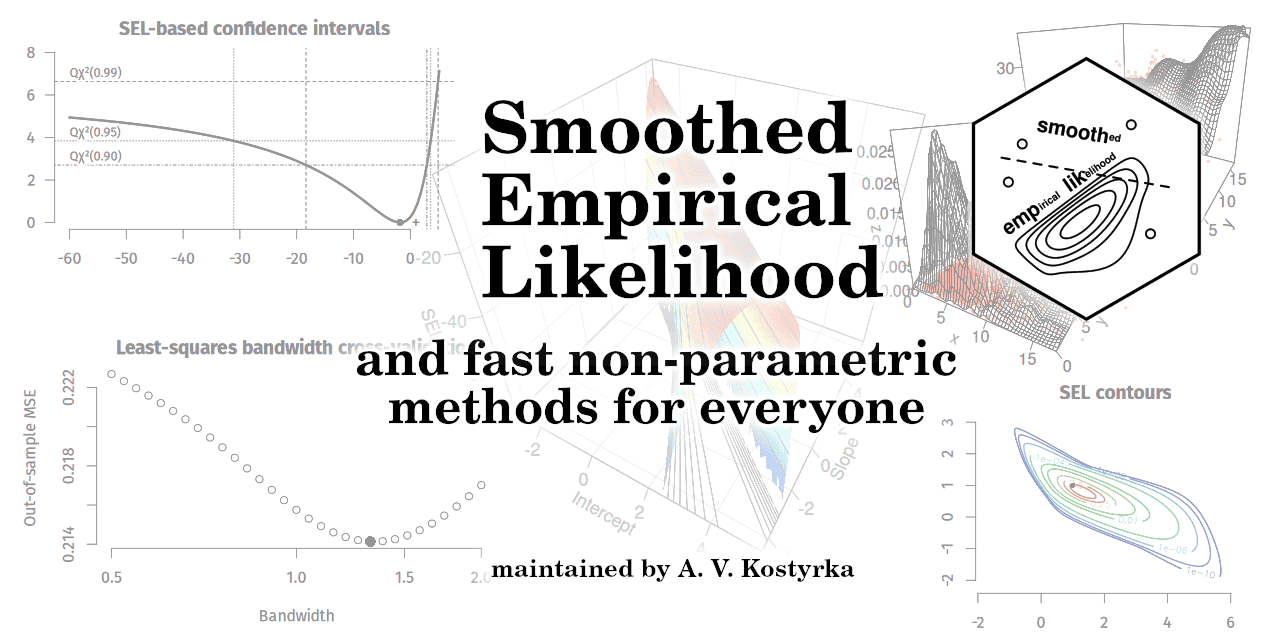R package for estimation via Smoothed Empirical Likelihood (SEL).

Smoothed Empirical Likelihood (SEL), also known as Conditional Empirical Likelihood (CEL) or Local Empirical Likelihood (LEL), is a powerful statistical method for estimation and hypothesis testing. It shares the competitive advantages of Generalised Empirical Likelihood (GEL) and can estimate models defined by conditional moment restrictions (CMR).
For statistical inference, SEL does not require any explicit variance estimation because the smoothed empirical likelihood ratio (SELR) statistic is internally studentised. Consequently, SEL-based confidence intervals and regions have accurate coverage probabilities. To test a hypothesis using SEL, the user should compare the difference between the unrestricted and restricted SEL values with the critical values of the chi-squared distribution. The SELR test achieves maximum average local power.
Some of the models that can be estimated via SEL include: - Linear models with exogenous and endogenous variables: Y = α + X’β + Z’γ + U, E(U | X, W) = 0; - Non-linear models: E(Y | X) = f(X, θ), where f is known; - Semi-parametric models: E(Y | X) = X’β + h(X, θ), where h is unknown; - Quantile regression models: E[I(Y - X’β) - τ | X] = 0.
Additionally, for a broad class of models, SEL can produce an estimator that is semi-parametrically efficient in the sense of Chamberlain (1987). Efficient estimation is the pipe dream of many empirical researchers because having an unbiased estimator with the smallest possible variance means accuracy. This accuracy leads to four main benefits: (1) having point estimates closer to the true value, (2) having smaller variances and standard errors, (3) discovering more statistically significant effects when they exist, and (4) ensuring that a lack of significance is not due to the weaknesses of the employed estimation method. For example, the popular ordinary-least-squares (OLS) estimator of a linear model is not efficient under heteroskedasticity – i.e. in virtually all real-world applications. This occurs because ‘noisier’ observations have a larger contribution to the objective function – the sum of squared residuals. In SEL, the objective function is a sum of local ELR statistics, therefore, all observations contribute similarly to the objective regardless of the conditional variance.
We hope that this algorithmic implementation of SEL will make it more popular among researchers in various fields.
This package is an evolving project. Comments and suggestions are welcome.
This package is similar to the popular gmm and momentfit packages by Pierre Chaussé. The main input to the SEL optimiser is the function that computes the sample moment condition. All that is needed is a formalised discrepancy between the model and the real observations.
For a linear model, the user can define the residuals like this:
resFun <- function(theta, data) data$Y - data[, c("X1", "X2")] %*% thetaThen, smoothEmplik() takes it as the input, and the
optimiser will find the value of theta that yields the
‘best’ fit of the model to the data. Here, ‘best’ means that these
residuals are closest to zero as measured by the sum of local ELR
statistics for each observation.
Unlike functions for unconditional-moment-restriction models that typically require input matrices obtained by taking products of GMM instruments with the residuals, the input to SEL is just a function that computes a vector of residuals (or their close analogues).
This package provides direct functionality for the following articles:
The theory behind the method is provided in the following sources:
This package currently exists only on GitHub. To install it, first,
obtain the compiler. * RTools installer
for Windows * Compilers
for Mac * sudo apt install r-base-dev on
Debian/Ubuntu/Mint or simply use the compiled version on Linux.
Run the following two commands to install the package:
install.packages("devtools")
devtools::install_github("Fifis/smoothemplik", build_vignettes = TRUE)To load this package, include this line in the code:
library(smoothemplik)If there are installation errors, they are likely due to the broken
dependencies of devtools: rlang,
bslib, lifecycle etc. or something else from
the tidyverse. In case devtools cannot be
installed, try upgrading R to the next major version (e.g. 4.2.1 → 4.4.2
may help) or removing the problematic dependencies and their
dependencies before retrying
install.packages("devtools").
This software is released under the free/open-source EUPL 1.2 licence.
EL0() or
EL1() for one-dimensional data. This is not a bug in
smoothemplik, but a consequence of the differences in
machine code. Testing showed that running these two functions for Figure
2.4 from Owen (2001) on R compiled for
aarch64-apple-darwin20 produced slightly different results
compared to running the same code on x86_64-pc-linux-gnu
and x86_64-w64-mingw32 systems, where its output is
identical.